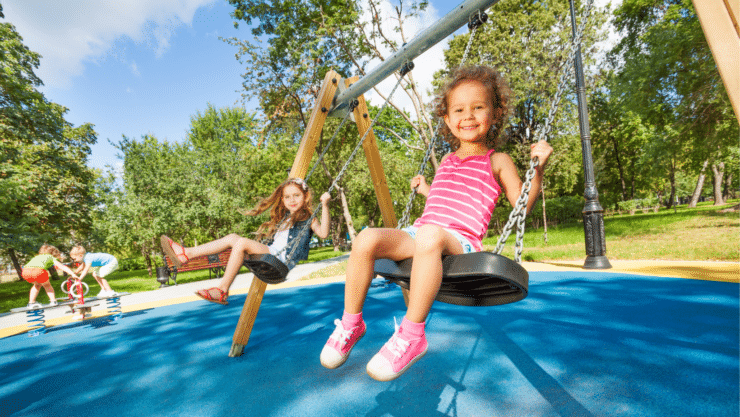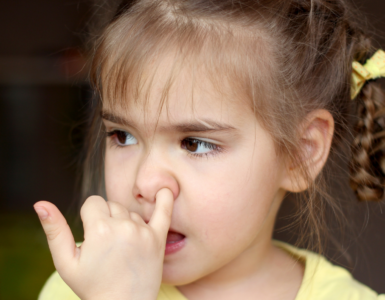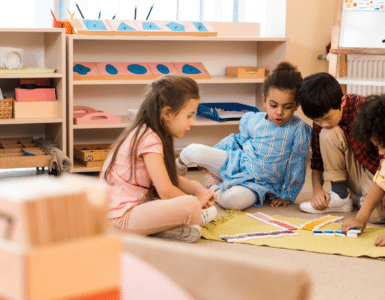Free play allowed for the freedom to explore and make-believe. It created a safe space for creativity and discovery without rules or guidelines imposed by adults.
When children play, they learn. However, according to Joe Frost, a leading American scholar of play, the decline of free play during the past 50 years is directly related to the current public health crisis, which has the potential to last for generations to come.
In the United States, for example, many public schools continue to reduce the amount of unstructured playtime for young children.
As children are pushed to adapt and prepare for their future “grown-up” roles, how does the lack of playtime impact their development?
Factors Affecting Free-Play Deprivation
A study published in the American Academy of Pediatrics states the main factors influencing play deprivation include:
- a hurried lifestyle
- changes in family structure
- increased attention to academics and enrichment activities
- severe poverty
- child labor
- neighborhood violence
- abusive home settings
- living in war-torn areas or countries
Consequently, lack of play may lead to children who are unable to recover from their experiences, making it difficult for them to be a viable part of their community during adulthood.
Impact of Play Deprivation on Child Development
As play-based learning is replaced by teach-to-test curricula, the impact on child development could be drastic, especially during children’s first ten years of life.
With public schools’ focus on reading and mathematics and with college entrance exams becoming more rigorous, many school districts in the United States have pivoted their focus away from play-based learning, recess, the creative arts, and in some cases, even physical education.

The impact of sustained play deprivation can be linked to the following:
- poor child development
- depression
- difficulty adapting to change
- lack of self-control
- a greater tendency to substance abuse and addiction
- superficial interpersonal relationships
Additionally, children who do not normally play from an early age may not learn the complicated nuances of healthy play. As a result, they may become isolated or bullied, or they may become bullies themselves.
According to a study in the American Journal of Play, since 1950, there has been an increase in anxiety and suicide rates, with suicide rates quadrupling from 1950 to 2005 for children under 15 years of age and doubling for teens and young adults ages 15-25.
Benefits of Free-Play
The benefits of unstructured play are many. Free play fosters cognitive, physical, social, and emotional development.
Allowing children to take part in unstructured play improves:
- Creativity and Imagination – Without fixed rules or guidelines imposed by adults, children can create their games with their own set of rules. Pretend play allows them to imagine a fantasy world of their creation which helps them develop their brainstorming and conceptualizing skills.
- Problem-Solving Skills – As children take turns, set up rules, and brainstorm activities during free play, they work together to solve problems and resolve any disagreements. Furthermore, as children are free to explore their environment, they must maneuver through their physical and social environments, which ultimately builds their confidence.
- Social Skills – Children practice social and teamwork skills through unstructured play. As they develop imaginary scenarios, they must make decisions together and learn to listen to each other and share. Furthermore, they learn to treat their playmates fairly and the value of cooperation.
- Handling Emotions – During free play, children may encounter challenging situations which may force them to control their emotions.
Just as they may experience joy and excitement from certain activities, some stressors may lead them to feel fear, anger, or frustration. These experiences may require them to learn to regulate their emotions if they are to continue to play well with others.
Allowing children time to free play can also help them explore their passions, be more sociable, enjoy better physical health, and help them improve their vocabulary and language skills.
Small Changes May Help Return to Unstructured Play
As parents learn the benefits of free play on their child’s development, they may wonder how to help them return to unstructured play.
Parents can re-introduce kid-based play by opening their children’s schedules. Leaving some unscheduled time slots will allow them the freedom to explore and use their creativity without stress or pressure from adults.
Opt out of some structured, team-based, organized activities. By doing so, children are given the freedom to explore their interests and passions according to their own rules.
Do not hover around the playground or during play dates. Although you want to make sure your children are supervised and safe, you must allow time for children to work on their problems and their differences on their own before helping.
Reducing screen time can also prove beneficial in encouraging children to explore through free play. It will also help them avoid a sedentary life.
If you feel your school district is straying too far from free play and creative activities, join their meetings, send letters, speak to other parents, and try to make a change from within. This will all be easier to handle when you think of the benefits to your child and their peers.
Final Thoughts
As a para-educator in a specialized classroom at a public elementary school, I witnessed first-hand the benefits of free play as I joined children during recess.
One particular child, who was shy and uncooperative, lit up as we hunted for make-believe sea creatures and went on magical quests through jungles, deserts, and the deep sea trying to save flying unicorn whales.
Free play allows for a safe space for creativity and discovery without the influence of adults. However, many factors have led to a reduction in the amount of unstructured playtime young children experience over the last 50 years.
As children are pushed to grow up and prepare for their academic future, it is important to keep in mind how the lack of playtime can impact their development into adulthood.









Add comment